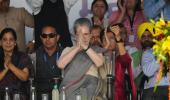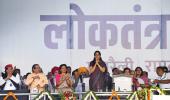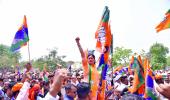'One is happy. The moment one starts criticising the BJP, ED, IT and CBI comes to one's house.'

The room at the entrance of Indian Police Service officer-turned-politician Nikhil Kumar's bungalow Sopan on Boring Road in Patna is lined with large painted portraits of his family members who have been in Indian politics.
His grandfather Dr Anugrah Narayan Sinha was a member of the Constituent Assembly and Bihar's first deputy chief minister.
One of Patna's well-known colleges down the road from the house is named after him and is popularly known as 'AN College.'
His father Satyendra Narayan Sinha was Bihar chief minister and a seven-time member of Parliament from Aurangabad, Bihar.
His mother Kishori Singh was an MP. His wife Shyama Singh also was an MP from Aurangabad.
Among the portraits is a group picture of India's governors along with then prime minister Dr Manmohan Singh and then President Pranab Mukherjee. Mr Nikhil Kumar, who served as governor of Nagaland [2009-2013] and of Kerala [2013-14], is in the picture.
The portraits line two parallel walls, underneath them are sofas for visitors where well-wishers discuss the denial of a ticket to Mr Kumar in muted voices.
A former director general of the National Security Guard, the Indo-Tibetan Border Police and police commissioner of Delhi, Mr Kumar joined the Congress two years after retirement and was elected MP from Aurangabad in 2009.
He is disappointed about not being fielded by the Congress because the seat went to INDIA alliance partner, the Rashtriya Janata Dal, in the seat sharing arrangement, but maintains a dignity about it.
"I subscribe to the ideology of the Congress. Others are welcome to subscribe to the ideology of the current party, but this ideology runs counter to the idea of India," Mr Kumar tells Rediff.com's Archana Masih in the concluding part of the interview.
- Part 1 of the Interview: 'The electorate is not allowed to think'

Why did you decide to take up a political career after your long career in the IPS? Were you inspired by your parents?
As a government servant, I was never swayed by politics even though I belonged to a political family.
My family has a history of over 100 years in politics. After retirement, I waited for two years and then joined the Congress party.
When I joined the Congress, it was not in very good shape. It had been in the Opposition for some time after Narasimha Rao's tenure when there were non-Congress governments at the Centre for several years.
I was under pressure from my constituency and other people also. They all wanted me to join politics and carry on the tradition of my family.
I was not a hard boiled politician, but I did what my people wanted me to do.
How different was politics from your parents, your wife and your time to what you see now?
There is a clear difference in what the country was like under Congress rule and non-Congress rule.
The ideology of the Congress is different from that of the current ruling party. What the ruling party is doing as far as the economy is concerned is building upon the base laid by the Congress party during the Narasimha Rao government when Dr Manmohan Singh was the finance minister. The Indian economy picked up and successive governments have only added to it.
Had the Congress government not liberalised the economy, I don't think successive governments would have been able to take decisions affecting the good health of the economy.
Those who belong to the Congress subscribe to the ideology. Others are welcome to subscribe to the ideology of the current party, but this ideology runs counter to the idea of India.
You can't have an ideology that cuts at the very root of the idea of India.
The policies of the ruling party are an attempt to divide the country. This division is not going to be helpful for the country. We have experienced the division of this country once before with devastating results.
We have to stick to the fact that there is an idea of India and this idea has to be protected. The current dispensation is attacking this very idea which is unacceptable.

There are so many Congress politicians who have joined the BJP. Has it ever occurred to you to join the BJP?
Never. I might tell you that it is not that I have not been approached. I am too much of a Congressman to think about leaving it, no matter what the condition the party maybe in.
You have known the Nehru-Gandhi family, how different are the present Nehrus from the ones that preceded them? Have you interacted with Rahul Gandhi?
Rahul Gandhi is a very simple, straightforward, person. He means what he says. He belongs to a family that people expect to play a role in India's politics and that is why he is in politics.
He demonstrated the fact that he cares for the country by walking 4,500 kms from Kanyakumari to Kashmir -- and now from east to west. How many people will do that?
He had everything going for him when the UPA was in power. He could have become a minister and was told so a number of times. His seat was two seats away from me in Parliament and I once had a long chat with him and asked him to join the government, but he said that would be wrong on his part.
He could have become something in the government, but he chose not to until he understood the whole country. I think that is a very principled stand.
Not many people can do that and I think he has inherited this quality from his father.
What do you see as the future of the Congress?
It is a cycle. We were on top and are no longer. The cycle is moving. The Congress has the ability and will power to overcome handicaps. It might take some time. Let us wait for the impending Lok Sabha elections to see what the results are.

As a former IPS officer, how do you see the deployment of central agencies against the BJP's political adversaries?
Not only as an IPS officer, but as a citizen of this country we are all watching how the BJP is utilising the agencies of the government.
If you take an overview of the people who have been investigated or charge-sheeted or against whom cases have been registered -=every one of them happens to be from the Opposition parties. I don't think it is a mere coincidence. Unfortunately, it is the decision of the ruling party.
In the past ten years have you come across any case that has ended in a conviction?
It is to create a furore and public impression that all these things are being done. As long as I am friendly [with the BJP] I am happy, the moment I start criticising you, the ED, IT and CBI comes to my house.
Look at former J&K governor Satyapal Malik who served as governor to several states, including Bihar. As long as he was governor, all was okay. Once he started making statements against the government, some agency or the other started raiding his house.
His statement was that they can raid my house, but will not find anything except some dhotis and kurtas.
This is the most unhindered use of the agencies and it is most obvious against Opposition parties.
The Opposition has said that almost 95% raids have been against Opposition parties. You have been in the IPS, can the agencies refuse the government's diktats?
The agencies act on complaints and have to act upon them. These agencies have to work on the basis of the information given to them. I will not say that the IPS or other officers are at fault.
They are only doing what they are expected to do when a set of information reaches them.

Or is it that the politicians against whom investigations are being launched have skeletons in their cupboards and the agencies' actions are justified?
Then there should be some positive conclusion. The cases should be tried in a court of law and should lead to a high rate of conviction. How many cases have been prosecuted? How many have been charge-sheeted?
The Opposition has said that investigations are put on limbo once an Opposition leader facing such raids joins the ruling party.
Pick up a newspaper and see who has joined the BJP and it becomes too obvious.
What is your gut feeling about how the Congress will fare nationally?
It will not fare as badly as people expect. It will fare better. There are three states held by the Congress and we have number 2 positions in almost all states.
The important statistics is the difference in the votes polled by both parties in the last election. The difference is about 3.5% to 4%. This country has a solid block of supporters for the Congress.
Feature Presentation: Aslam Hunani/Rediff.com











 © 2025
© 2025